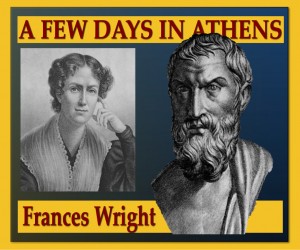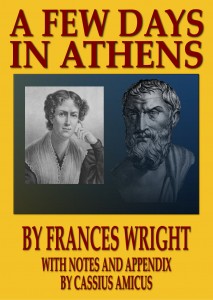Pride, Vanity, Ambition … and Cynicism
 The following is a fictional dialogue from Frances Wright’s “A Few Days In Athens,” Chapter IV. In this sequence, Gryphus the Cynic had just confronted Epicurus to demand that Epicurus stop teaching in Athens. After Epicurus of course declined the demand, Gryphus left, and this exchange ensured between Epicurus and his students regarding the uncouth dress and demeanor of Gryphus in particular, but with application to Cynics in general:
The following is a fictional dialogue from Frances Wright’s “A Few Days In Athens,” Chapter IV. In this sequence, Gryphus the Cynic had just confronted Epicurus to demand that Epicurus stop teaching in Athens. After Epicurus of course declined the demand, Gryphus left, and this exchange ensured between Epicurus and his students regarding the uncouth dress and demeanor of Gryphus in particular, but with application to Cynics in general:
“There [referring to Gryphus],” said the son of Neocles to his smiling disciples, “is a good warning to any, or all of us, who would be philosophers.”
“Nay, master,” cried Sofron, “do you think us in danger of following the pleasant example of this savage? Do you, indeed, expect to see Lycaon there, with beard, head, and clothing, after the fashion of Gryphus?”
“Not beard, head, and clothing, perhaps,” answered the Gargettian, “pride, vanity, and ambition, may take less fearful coverings than these.”
“Pride, vanity, and ambition? I should rather suspect Gryphus of the want of all three.”
“Nay, my son, believe me, all those three qualities were concerned in the carving of those three frightful appendages of our cynic’s person. Pride need not always lead a man to cut mount Athos in two, like Xerxes; nor ambition, to conquer a world, and weep that there is yet not another to conquer, like Alexander; nor vanity, to look in a stream at his own face till he fall in love with it, like Narcissus. When we cannot cut an Athos, we may leave uncut our beard; when we cannot mount a throne, we may crawl into a tub; and when we have no beauty, we may increase our ugliness. If a man of small, or even of moderate talents, be smitten with a great desire of distinction, there is nothing too absurd, perhaps nothing too mischievous, for him too commit. Our friend, the cynic, happily for himself and his neighbors, seems disposed to rest with the absurd. Erostratus took to the mischievous — to eternize his name destroying that temple, by the building of which Etesiphon immortalized his. Be it our care to keep equally clear of the one as the other.”


